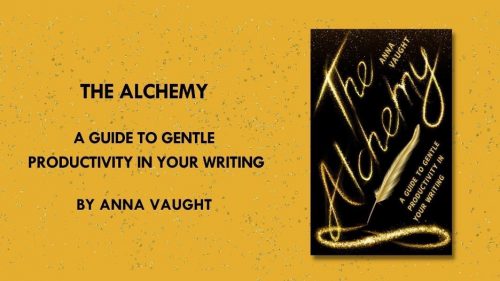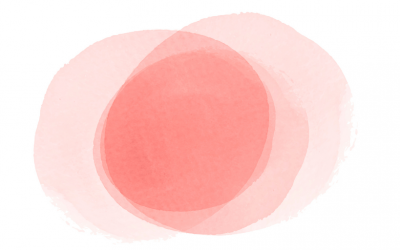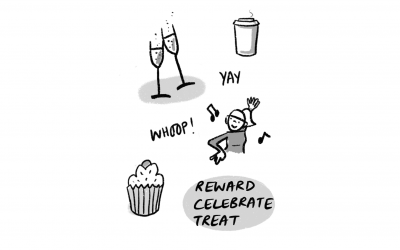What does it mean to be productive? How can writers keep going when it feels like everything is stacked against them? Novelist, essayist and short fiction writer Anna Vaught shares the alchemy of gentle productivity that helps her keep writing.
Six years ago, I started to write, having wanted to for many years. I didn’t have the confidence, resilience or time. Since then, I have written eight books, the most recent of which is currently crowdfunding with Unbound – The Alchemy. A Guide to Gentle Productivity in Your Writing, as well as essays, columns and short fiction that’s been published in journals, anthologies and the national press.
I was extremely busy all this time. As well as writing, I work part time as teacher, I tutor and mentor other writers, and have a family to support. That got me thinking about busyness, productivity and what it means to keep going. To explain why I am writing about this, I need to introduce myself to you, to tell my story and describe the chain of events that led me here.
>> Read more: The resilience to keep writing
A short biography
As a child I was often scared. I didn’t really understand what was happening to me a great deal of the time because I could not reasonably share things with anyone. I knew it was not healthy to manage things as I did; to corral the contents of my room; to hurt myself and spend hours at night crying because I thought I was the bringer of harm and that if I thought bad thoughts, then they would leap out and happen to people.
I had lots of lovely things happen to me as a child and teenager. But because of unkindness, a feeling of not being safe in the family home and of being under threat, I was scared. I relied on reading, the natural world, and my imagination to get me through.
In recent years, I’ve been managing recurrent mental health problems. I’m a mother of three children and one of my older boys has been very ill, made more challenging by the absolute failure of a school and multiple agencies to support him or us as a family. I also have neurological damage down one side and Long Covid has done tough work to two years of my life. I will have to go and rest as soon as I have finished writing this. There is no alternative.
>>Read more: Grief induced writer’s block – how to get through it
I cannot undo anything that happened to me or the feelings and fear I am still left with, but I know now that I can go forward and send how I managed outward to help empower others.
Starting to write
Six years ago I started to write. I knew no-one in the industry, but one thing I did know: that hardship had made me draw consistently on my reading, on my imagination and on creativity. That’s how I started.
Over that time, I have dipped in and out of health and in and out of intense periods of challenge and being up all night, thinking, keeping others safe: lying on the floor.
How to keep writing
I kept going with the writing, however, in little gaps, in gentle steps, on walks, in bubble baths. I would try to unfurl a thought when I had to be up at night, saying to myself, ‘Just this one little thing, Anna.’ And then I would do another little thing.
With this, I had to deal with a couple of really difficult experiences that have happened in my publishing experience. So, in addition to the small steps, I built a tribe around me, of friends who understood things about the publishing world and were sympathetic to creative endeavour and, frankly, to whom I did not have to account for illness, being a carer or being a trauma survivor, batting away the residue each day.
Through it all, I kept reminding myself of how I had long used my imagination as a powerful tool, and relaxed and hidden in it too.
>> Read more: #100DaysOfWriting – the gentle approach to writing productivity by Jenn Ashworth
Three lessons in gentle productivity
1. Start where you are
Work with what you have. In that mind of yours are tremendous resources, regardless of what a varied and adventurous life you have led to heretofore; regardless of how constrained your life has been.
You contain multitudes and you are a miracle. So just dwelling in that imagination, within your own thoughts and then, in little increments of twenty minutes is the work.
Thinking is the work: YOU and observation of yourself and asking small questions of and about yourself is the work. It’s productive indeed to be parsing the YOU data.
2. Take small steps
It is not the amount of time you spend, or how hard you work but the quality of what has been done. So, if you can establish a crystalline idea just while you are mulling, perhaps about yourself, or perhaps in observation of tiny details about you on a commute, a look out of the window, a walk, that is the beginning of your book or your short story collection.
Observe and try those small questions: you are working away, and you hardly notice. Keep asking questions, try to answer them: keep moving forward.
From these, form a plot, keep at it, step by step; a draft; an edit: a book. This is what I have done and how I know to make progress.
>> Read more: How small steps lead to great progress
3. Find your tribe
Life is difficult; the past few years have been a maelstrom. To be productive in extremis, in anxiety, as you recover from illness, when you are lost, sad, bereaved, concerned about the state of the world, push on with a creative project – in gentle steps – with a tribe.
Who ARE these people? In my case, a group of writers, largely online, where situations are understood and where we are rooting for one another. I am shy, but I approached people and asked them to be in a little writing support group with me. There are others I have met, too. These people are your pals, but they are also part of your being productive (and you are part of their work) because they help you feel seen, safe, and nourished.
>> Read more: Start building your writing resilience
By the same token, be very careful in real life and on social media about those who sap you of energy and you have no time for someone who is relentlessly full of negative criticism or, God Forbid, a gaslighter or someone who seeks to squash your creative spark. They exist. I have had to deal with them. I could because of the tribe.
The alchemy of productivity
I hope that, if you are reading this while feeling down, jaded, or lacking in self-belief, I have comforted and encouraged you. Yes. It takes a great deal of time to write a book, but it starts with small questions, clear thoughts, and small steps.
Productivity is often considered to be to-do lists and spreadsheets and word count and goals and deadlines. But it is also quiet and may go unnoticed: it happens in rumination, on a bus journey, at a time when your heart is broken, and when you think you cannot.
I know this to be true, and I wish someone had told me years ago as I pass it to you. Have faith in the alchemy of productivity.

[et_bloom_inline optin_id=optin_7]




